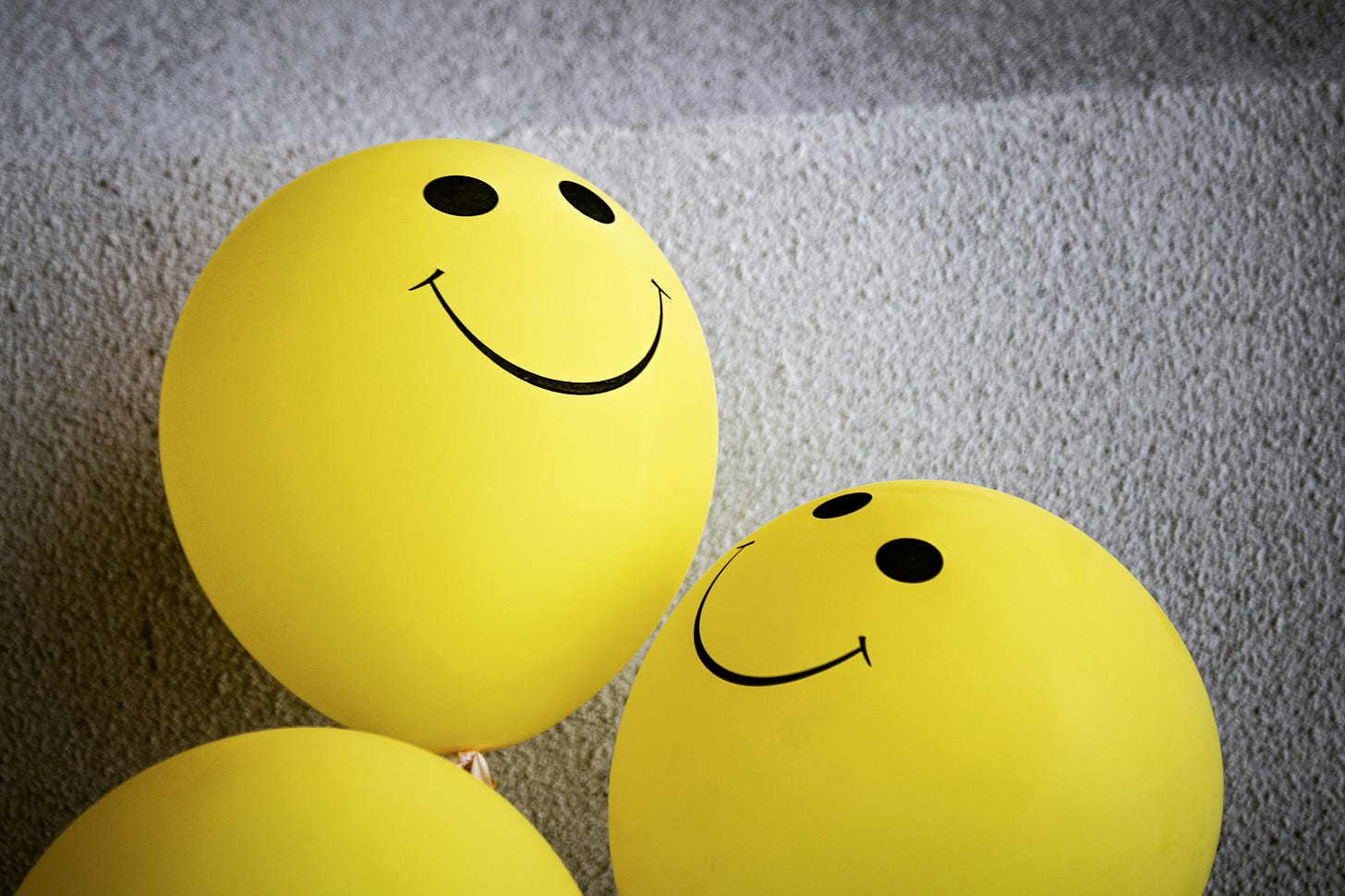Go positive, go first, and be constant in doing it
A formula that is simple, yet underutilized

So many interactions these days seem to follow the same negative blueprint.
Person #1 — who is feeling some combination of anger and frustration — rails against Person #2. Person #2 might simply be in the wrong place at the wrong time, or the source of the ire, but either way, they are immediately put on the defensive.
Feeling threatened, Person #2 responds in kind, spewing venom right back at Person #1, which sends the conversation into the dreaded Rage Spiral.
Predictably, it goes downhill from here. Lots of shouting. Profanity. Threats. Insults about one’s mother. Occasional fisticuffs.
It’s not pretty.
Okay, so this might be a slight exaggeration — not every argument descends into a battle royale. But there is no question: negativity is all around us.
To some extent, I get it. I’ve been dragged into my share of Rage Spirals over the years. There are many reasons to be angry at the world. People are rightfully frustrated and afraid. But there is a societal cost to all this negativity. If we can’t trust one another, lend a helping hand to a stranger, or see the best in each other, basic human interactions become that much more difficult.
The goal of today’s post is not to delve into the why behind interpersonal conflict, but instead, what can be done to prevent it in the first place. We may not be able to change society, but we can change ourselves.
Because there is something we can do, a simple formula that can build healthy relationships and enrich our lives over the long term.
Go positive, go first, and be constant in doing it
A few years ago, CEO and author Peter Kaufman gave a speech1 to the Economics Club at California Polytechnic State University Pomona.
The topic of Kaufman’s speech was multidisciplinary thinking, more specifically the magic that happens when you combine two key concepts: mirrored reciprocity and compound interest.
Or, to put it simply: Go positive, go first, and be constant in doing it.
By fusing these concepts, Kaufman provides a handy playbook to help us eliminate (almost all) negativity from our interactions.
It’s incredibly simple; it’s also underutilized.
Mirrored reciprocity
The first part of the equation is mirrored reciprocity, which is the human equivalent of Newton’s Third Law of Motion, which states that for every action, there is an equal and opposite reaction.
In other words, we get what we give, and vice versa.
To illustrate this concept, Kaufman references the famous Mark Twain quote: “A man who picks up a cat by its tail will learn a lesson he can learn in no other way.”
Basically, if you lift a cat by the tail (please don’t ever do this), the cat will hate you and claw at you until you stop.
If you then try to swing the cat by its tail (do you have a death wish?), it will try to gouge your eyes out, and for good reason.
But if instead, you pick up the cat (like a normal person), nestle it in your elbow, and gently stroke it, the cat will purr and lick your finger in approval.
How the cat responds is entirely dependent on how you act first. This is mirrored reciprocity.
In human relationships, it’s the same way. Kaufman uses the example of getting on an elevator with a stranger already inside. If we smile and say hi to the person, they’ll almost always smile and say hi back.
If we say nothing and avoid eye contact, they’ll do the same.
And if we sneer and hiss at them, you guessed it, they’ll respond in kind.
Who wants to go first?
And yet, despite the overwhelming likelihood that our kindness will be reciprocated (Kaufman estimates this will happen 98% of the time), we often default to saying and doing nothing. This raises the question: if we know that there is a 98% chance of a positive interaction, why don’t we always start with kindness?
Economist Daniel Kahneman won a Nobel Prize for answering this question. In economics it’s called loss aversion: the pain of loss is more acute than the joy of gain.
In other words, we are so afraid of the 2% chance of negativity that we choose to ignore the 98% chance of a positive outcome.
Of course, you might be thinking, “But I’m always in a bad mood!” or “I have every right to be pissed off!” Fair enough. But all things being equal, we should try to go positive. Otherwise, we snuff out trust before trust can take root, leaving us closed off and fearful. And that’s no way to go through life.

Be consistent
This brings us to the third part of the equation: consistency. If you do anything enough times, it starts to build on itself.
If you make the decision to go positive and go first, and do it consistently, you will fill your life with a steady stream of positive interactions, even if you get burned from time to time.
The key is to be consistently cheerful, even when you don’t feel like it. This is not toxic positivity as much as it’s a commitment to keeping negativity at bay. If you default to empathy and kindness, life becomes more pleasant.
Consistency is also key when you are communicating with the same person over and over. Let’s say you have a difficult coworker. This person might drive you up a wall. If they get on your nerves, you might be tempted to go first and go negative, seeking confrontation as a way to get even with them.
But if instead you commit to being positive, and do so day after day, a funny thing starts to happen: they will let down their defenses, little by little. You might even become their friend.
This won’t work all the time, but it happens quite a lot; I’ve seen it firsthand in my career. Even the most curmudgeon-y souls eventually respond to a positive person. (Unless you are an insufferable Pollyanna, in which case, all bets are off.)
There will be days when it will be hard to go positive and go first. But consistency is key. After all, you never know when a simple positive interaction could change your life.
I love this example from a recent Wall Street Journal article:
Nir Zicherman was a mediocre law student having trouble landing a summer internship. On his way to an interview, he got in an elevator and made a joke to the woman next to him, who was holding a tray of coffee cups.
“You must really like coffee,” he said. It changed his life.
The woman, it turned out, was the hiring manager for the job he was going for in NASA’s legal department. She loved the joke and gave him the internship. The summer stint inspired Zicherman to teach himself to code, scrap his law career for tech and eventually co-found a startup. He sold it to Spotify for millions in 2019.
“It’s just, like, everything can be traced back to that one elevator ride,” says Zicherman, now an entrepreneur and writer in New Jersey.
We can’t help but wonder: how would Nir’s life have turned out if he said nothing and avoided eye contact?
Life-changing impact
Humans, at our core, just want to be loved and respected. We are constantly seeking acceptance in our relationships, whether it’s with our spouse, our family and friends, or complete strangers.
If we keep this in mind when we interact with others, we can provide the love and respect that they seek. And in return, we will get back the same.
Says Kaufman:
All you have to do, if you want everything in life from everybody else, is first pay attention; listen to them; show them respect; give them meaning, satisfaction, and fulfillment. Convey to them that they matter to you. And show you love them. But you have to go first.
And what are you going to get back? Mirrored reciprocation. Right? See how we tie this all together? The world is so damn simple. It’s not complicated at all! Every single person on this planet is looking for the same thing.
Go first, go positive, and be consistent. If we do this enough times, our lives will change dramatically for the better, regardless of the 2% negative risk.
Many people are hurting. Many people cautiously tip-toe through life, wearing their pain on their sleeves, defenses always at the ready, on the lookout for conflict. Many people, sadly, have forgotten what it’s like to be a recipient of kindness, to be loved and accepted unconditionally.
In a world that is going crazy, it is easy to go negative. It may be satisfying in the short term to chew out a customer service rep, curse at the person who bumped into you on the street, or go ballistic at someone with a different way of seeing the world.
But negativity can only lead to one outcome: more negativity.
We possess the power to break the cycle; we just have to use it.
Misc.
I have been in a reflective mood recently. My uncle passed away on January 18th and I am finally ready to write about him, which will be the topic of next week’s post. Next week is also the 11-year anniversary of the passing of my friend Carly. I wrote about her on the 10-year anniversary last February. I’m going to re-publish the post on the 17th for those who may have missed it the first time.
In tomorrow’s audio extra for paid subscribers, I will share two stories about how going positive and going first has changed my life.
- of wrote a beautiful essay on “Grief math” the other day. It gave me chills reading it.
It’s an insightful speech, even if you aren’t normally interested in economics and mental models. I highly recommend reading/listening to it!




I really love this piece Chris. I try to practice this when I am out and about. I’m going to work on my consistency though. It really is a better way to go through life. A great reminder for anyone experiencing the February blah’s.
And very sorry for the loss of your uncle, Chris.
Sincerest condolence on your loss. Thank you for this post... Not only did I laugh out loud, it actually came right at a "darkest hour before the dawn" moment for me and was such a good reminder of how to reset with consistency. Appreciate you.